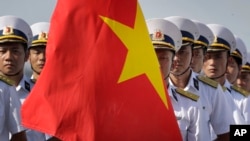Vietnam's prime minister will be hoping for answers for Southeast Asia about the future role of the United States in helping the region resist Chinese expansion in a widely disputed sea.
Next week Prime Minister Nguyen Xuan Phuc is expected to become the first Southeast Asian leader to visit the White House since Trump took office in January. Trade and maritime claims in the disputed South China Sea are expected to be high on the agenda.
Brunei, Malaysia, Vietnam and the Philippines claim parts of the South China Sea, while China and Taiwan claim all of it.
Trump’s predecessor Barack Obama, who ran a much-hyped “pivot to Asia” policy, had helped Southeast Asian countries with defense against Beijing. But it is not yet clear what direction the Trump administration will take.
“Being the first Southeast Asian leader to visit Washington, the Vietnamese prime minister will want to explore U.S. plans and goals for engagement with the larger Southeast Asian region,” said Murray Hiebert, senior fellow at the Center for Strategic and International Studies think tank in Washington.
“Vietnam will also want to understand U.S. policy and strategy toward the South China Sea and China’s activities there, particularly at a time when Washington is looking to Beijing to rein in North Korea’s nuclear and missile programs,” Hiebert said.
China continues to worry Southeast Asian countries by sending coast guard vessels through their exclusive economic zones in the 3.5-million-square-kilometer sea and building artificial islets ready for radar systems and combat aircraft.
Obama last year lifted an embargo on lethal arms sales to Vietnam, stepped up joint naval exercises with the Philippines in 2014 and kept China on alert with the passage of U.S. vessels inside China’s maritime claim, all angering Beijing, which resented the U.S. role in a sea where Washington has no sovereignty claim but insists on freedom of navigation.
China uses historical records to back its claim to 95 percent of the sea that's prized for fisheries and fossil fuels.
Trump is trying to work with China to stop weapons proliferation in North Korea, which looks to Beijing as its chief supporter. Some analysts say Trump may have shelved U.S. involvement in the maritime dispute to get on better with China, which the U.S. government normally regards as a post-Cold War rival in global politics.
“They don’t really need to say it, but it’s very important that the (Southeast Asian) region is seeing that U.S. is still engaged,” said Frederick Burke, partner with the international law firm Baker & McKenzie in Ho Chi Minh City.
Vietnam wants stronger U.S. backing to offset a growing yet uncomfortable trade and economic relationship with old foe China, experts believe.
To reduce Washington’s influence, China is talking one-on-one with Southeast Asian countries, including Vietnam, about managing their disputes. Beijing sometimes offers the other countries aid and investment, such as promoting a surge in Chinese tourists in Vietnam.
Last week China and a 10-member group of Southeast Asian nations agreed to the draft framework of a code of conduct aimed at preventing mishaps in the sea. China had stalled for more than half a decade before giving its approval to move forward.
“All the Southeast Asian states tend to play a hedging strategy with great powers,” said Brian Eyler, Southeast Asia program director with Washington-based think tank the Stimson Center.
“No one state is too interested in getting too far into China’s or the U.S. or another great power’s sphere of influence," he said. "There are too many lessons of history that show that’s the wrong road to go.”
On other issues, the Vietnamese prime minister who took office last year, is expected to remind the Trump Administration about a U.S. commitment to cleaning up the toxic defoliant Agent Orange. The United States sprayed the herbicides over 4.5 million acres during the Vietnam War period from 1961 to 1972.
Analysts believe Nguyen is also all but certain as well to ask Trump’s administration about its pledge in January to negotiate a two-way free trade deal that would replace the 12-nation Trans Pacific Partnership (TPP). Vietnam stood to gain as a member of the tariff-cutting agreement because it depends largely on exports.
Washington left the deal in January about a year after it was signed, but Trump said the U.S. government would consider one-on-one deals if it found them better for American interests.







